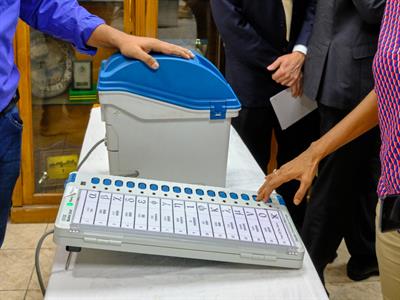PDF chapter test TRY NOW
Types of Elections in India:
Elections are classified into two types: Direct and indirect elections.
Elections are classified into two types: Direct and indirect elections.
Direct Elections
People directly vote for the candidates and elect their representatives. The following are examples of direct elections in which people over \(18\ \)years participate in the electoral process by casting their votes.
People directly vote for the candidates and elect their representatives. The following are examples of direct elections in which people over \(18\ \)years participate in the electoral process by casting their votes.
(i) Lok Sabha elections - Members of Parliament(MP) are elected.
(ii) State Legislative Assemblies - Members of Legislative Assemblies(MLA) are elected.
(iii) Elections to the local governing bodies, i.e such as village panchayat, town panchayat, municipalities, municipal corporations, are conducted by the State election commission.
(ii) State Legislative Assemblies - Members of Legislative Assemblies(MLA) are elected.
(iii) Elections to the local governing bodies, i.e such as village panchayat, town panchayat, municipalities, municipal corporations, are conducted by the State election commission.

Merits
(i) Direct elections are considered to be a more democratic method of election, as the voters elect their representatives directly.
(ii) It educates people regarding government actions and helps in choosing suitable candidates. Also, it encourages people to play an active role in politics.
(iii) It empowers people and makes the representatives accountable for their actions.
(i) Direct elections are considered to be a more democratic method of election, as the voters elect their representatives directly.
(ii) It educates people regarding government actions and helps in choosing suitable candidates. Also, it encourages people to play an active role in politics.
(iii) It empowers people and makes the representatives accountable for their actions.
Demerits
(i) Direct elections are expensive.
(ii) Illiterate voters sometimes get misguided by false propaganda. Campaigning based on caste, religion and various other sectarian considerations pose serious challenges.
(iii) Since conducting direct elections is a massive exercise, ensuring free and fair elections at every polling station is a significant challenge to the Election Commission.
(iv) There are instances of some political candidates influencing the voters through payments in the form of cash, goods or services.
(v) Election campaigns sometimes results in violence, tension, law and order problems and affects the day-to-day life of people.
(i) Direct elections are expensive.
(ii) Illiterate voters sometimes get misguided by false propaganda. Campaigning based on caste, religion and various other sectarian considerations pose serious challenges.
(iii) Since conducting direct elections is a massive exercise, ensuring free and fair elections at every polling station is a significant challenge to the Election Commission.
(iv) There are instances of some political candidates influencing the voters through payments in the form of cash, goods or services.
(v) Election campaigns sometimes results in violence, tension, law and order problems and affects the day-to-day life of people.
Indirect Elections
Voters elect their representatives, who, in turn, elect their representatives. This method of election is followed for the election of the President of India.
Merits
(i) Indirect elections are less expensive.
(ii) It is more suited to elections in large countries.
Demerits
(i) If the number of voters is very small, there exists the possibility of corruption, bribery, horse-trading and other unfair activities.
(ii) It is less democratic because people do not have a direct opportunity to elect but instead do it through their representatives. So, this may not reflect the exact will of the people.
Voters elect their representatives, who, in turn, elect their representatives. This method of election is followed for the election of the President of India.
Merits
(i) Indirect elections are less expensive.
(ii) It is more suited to elections in large countries.
Demerits
(i) If the number of voters is very small, there exists the possibility of corruption, bribery, horse-trading and other unfair activities.
(ii) It is less democratic because people do not have a direct opportunity to elect but instead do it through their representatives. So, this may not reflect the exact will of the people.
Reference:
Mirko Kuzmanovic / Shutterstock.com
